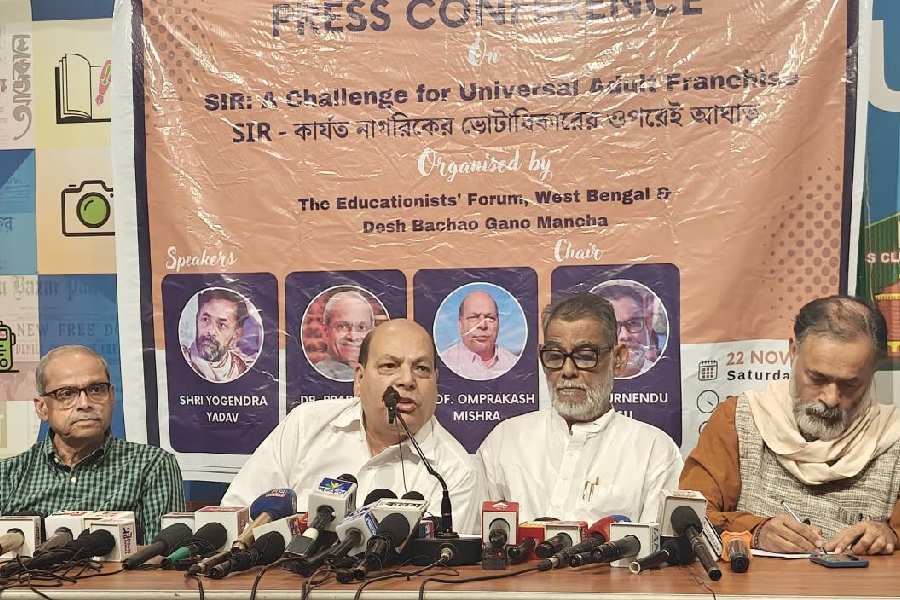Economist and political commentator Parakala Prabhakar on Saturday said that the special intensive revision (SIR) was not a drive to cleanse the electoral rolls but an attempt to create second-class citizens in India who would not have the power to vote.
“Now, if someone is disenfranchised and pushed out of the political community, they become a second-class citizen. This is the fundamental aim of SIR — to make a large section of marginalised people, poorer people, uneducated people, minorities and forest dwellers eliminated from the political community,” said Prabhakar.
Prabhakar, who is the husband of Union finance minister Nirmala Sitharaman, was a key speaker at an event titled ‘SIR: A Challenge for Universal Adult Franchise’, along with activist Yogendra Yadav.
The event was jointly organised by Desh Banchao Gano Mancha and the West Bengal Educationists’ Forum at the Kolkata Press Club, where Prabhakar elaborately discussed why he believed the SIR process had nothing to do with cleansing the voter list.
“SIR is much more than an electoral issue. It is a mistake to see it merely as an electoral matter or just a correction of the electoral roll. SIR is nothing but a bloodless political genocide,” he said.
“Earlier, genocides used to happen through the killing of people — the elimination of those who did not belong to the same religion, ethnic group, cultural group, linguistic group or other communities. But here, it is not done by killing. It is done by depriving a large number of people of their fundamental right to vote. Once this right is taken away, the essence of citizenship is lost. The person is no longer a meaningful participant in the political process or political community. This is what SIR means,” he said.
Prabhakar, who was formerly a communications adviser to the Andhra Pradesh government, said the SIR was a process through which the BJP-run government is attempting to choose its voters.
“We have always understood that voters choose the government. But with SIR, it is now the government choosing the voters,” said Prabhakar, echoing chief minister Mamata Banerjee’s claim that SIR was a disguised version of the NRC and the CAA.
"There were massive protests against the NRC and the CAA, and they could not proceed with it. So SIR is nothing but a backdoor NRC or CAA, intended to weed out those whom they (BJP) believe should not be here,” added the economist.
Though Prabhakar referred to instances from Bihar, many political experts said that the SIR process would not be similar in Bengal because the ruling dispensation here is the Trinamool Congress, which has been opposing the exercise strongly and monitoring every step closely.
Yadav, who has researched the Bihar SIR model, however, asked the people of Bengal to remain vigilant.
He said he believed Bengal was the main target of the BJP among all states to disenfranchise the highest number of voters from the existing electoral rolls.
Yadav referred to central government data, claiming that on January 1, 2026, the total number of adult voters in Bengal is 7.68 crore, while the total number of electors before the SIR was announced was 7.67 crore. He said that if the total number of electors decreases from the existing figure, it would be a matter of concern.
“Many people who are inconvenient for the BJP will be thrown out of the electoral rolls through this SIR. My fear — and I sincerely wish to be proven wrong — is that West Bengal is likely to witness the largest disenfranchisement in the history of India, perhaps even in the history of the world,” said Yadav, requesting all citizens of Bengal to stay vigilant during the entire SIR process.
“Finally, I have an appeal: you, the citizen, must remain vigilant. Bihar was the testing ground, and it (SIR) was designed ultimately for Bengal,” he added.
Yadav also raised concerns about women voters decreasing in Bengal post-SIR, drawing parallels with the Bihar experience.
“The experience of SIR in Bihar has already shown us that it is a process of reducing the electoral population. Bihar has shown that among the people disenfranchised, women are more affected than men. In Bihar alone, nine lakh women who should have been on the electoral roll were dropped because of SIR,” Yadav added.










